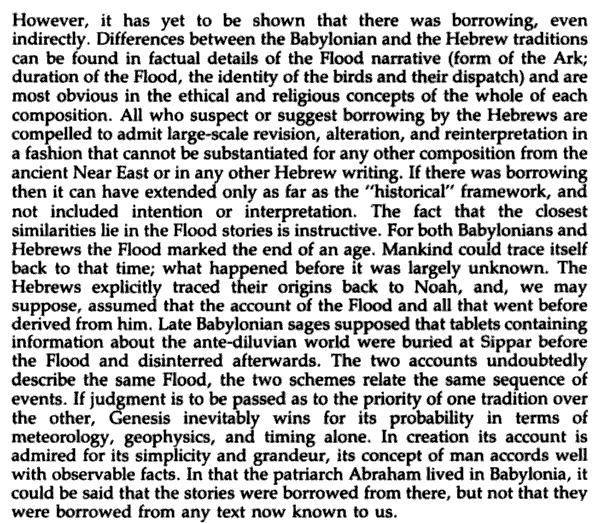Genesis and Mesopotamia
Boldly Rushing into the 1880s
One of the great myths perpetuated by Zecharia Sitchin and those who promote his material is that the material of Genesis 1-11 (and other parts of the Bible) are "borrowed" from the Sumerians and Akkadians. This was the predominant view in biblical scholarship nearly 150 years ago, but the idea now has been abandoned. The reasons are several:
More is known today about Sumerian and Akkadian. These languages were just beginning to be deciphered and studied in the mid-to-late 19th century. Scholars today have a deeper knowledge of the linguistic disconnections between those languages and material in Genesis than ever before.
The late 1920s saw the discovery of the Ugaritic cuneiform material. Ugaritic turned out to be far closer to biblical Hebrew than Akkadian or Sumerian, and the literature of Ugarit had closer parallels to biblical material.
The scholarship of the late 19th century was predisposed by anti-Semitism, and so many parallels put forth by scholars with anti-Semitic beliefs were contrived or exaggerated.
The logical question, then, was "what's the alternative?" The answer is *not* that the Hebrew Bible was dictated from on high and is utterly unique. That is also a view that has proven to be untenable with the advance of modern scholarship.
The alternative is actually quite simple. No legitimate scholar in biblical studies disputes that there are similarities between the literature of Israel, Sumer, Akkad, Ugarit -- and Egypt, and the Hittite civilization. The question is why the similarities exist. The answer held in great consensus today is that it is because all these civilizations shares a common cultural, linguistic, literary, and religious worldview. Because parts of the Hebrew Bible were composed or edited in Babylon during the exile, the possibility of some borrowing here and there exists, but it is done for fairly obvious reasons of theological polemic. In other words, The Hebrew Bible, as the latest literary creation among these civilizations, at times draws on each of them, not for worldview material (they already had a common pool of ideas), but to make deliberate, often antagonistic, theological statements about the beliefs of the other nations and their belief in the superiority of their God, Yahweh, compared to others.
Scholarship on "Panbabylonism"
The now antiquated notion that there is heavy borrowing by the authors of the Hebrew Bible of Mesopotamian material is referred to as "Panbabylonianism" by today's scholars (it refers to seeing parallels and borrowings everywhere in the Old Testament). There have been a number of recent articles and books on this subject that are accessible to non-specialists. I've blogged about several of them on my PaleoBabble blog:
- Is Zecharia Sitchin Anti-Semitic? (I don't think for a minute he is, but his views on Genesis originate with anti-Semites)
- The Bias of 19th Century German Biblical and Assyriological Scholarship (more on anti- Semitism in PanBabylonianism)
- Is the Book of Genesis Plagiarized from Sumerian and Akkadian (Mesopotamian) Sources?
There are also several good resources for non-specialists on this issue that are a bit older. For example, in John Walton's book 1990, Ancient Israelite Literature in Its Cultural Context, he quotes cuneiform scholar Alan Millard at length on this issue:
